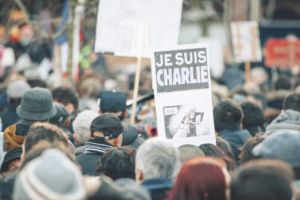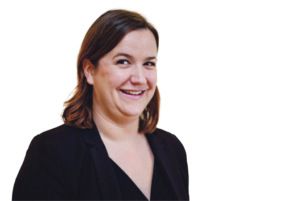Opinion
You’re Still Here: The perils of ‘Us and Them’
Fact box:
This article is more than 9 years old.

Je suis Charlie, but not Berat, Mahmouf and Ali it seems
One of my duties at the science centre where I had my summer job during my studies was briefing school trips as they arrived.
The norm for 15 years
One Friday in September, I had to tell the children we were marking some terrorist attacks in the US with a moment of silence. They reacted with a desperately sad quietness in their downcast eyes – in stark contrast to their jolly excitement before I started my speech. “This is going to leave a mark,” I thought.
Fifteen years later, the children I teach cannot remember 9/11. Terrorism is part of the background noise for them, much as the Troubles and the Cold War were for me.
Older students ask me why the news covers the terrorist attacks in Paris and Belgium in so much detail, but barely mentions Turkey, Pakistan and Lebanon. They ask why white gunmen are considered mentally unwell, while those from the Middle East are calculated killers. What am I supposed to say?
Younger students ask simpler questions, but there are still no easy answers. Why is this happening? What if the bad guys win? Are we safe?
A bedtime story
I have to channel Mr Rogers to get through those conversations, desperately hoping my student cannot see the tears welling up. I say something along the lines of: “Of course the bad guys won’t win. When scary things happen, look for the helpers. There are always helpers. The bad guys are outnumbered. They can’t win.”
We, the adults, have demanded a simple bedtime story and we are getting exactly what we wanted. The protagonist of the story is everyone living in a developed nation. The antagonist is made out to be Muslims – especially refugees.
When Islamist terrorists attack European targets, an ‘Us and Them’ scenario is perpetuated by the incredible amount of bandwidth expended on reporting on it. When attacks do not fit the narrative – for example Muslims are killed or a non-Muslim is a killer – they barely merit a headline or two.
Breaking the trend
All this does is alienate those on the wrong side of ‘Us and Them’, which plays straight into the hands of terrorists of all kinds. It seems to me there are two possible ways out of it.
Option one: make the story even simpler so even a child could understand. The bad guys are anyone who uses terror and bloodshed. The good guys are everyone else. This means giving the same weight to all acts of violence, no matter who perpetrated them or was victimised by them.
Option two: understand that it is not story time and we are not children any more. The interplay between religious, political and economic spheres has violent consequences for people across the world. It’s not just about ‘bad guys’ and ‘helpers’: that is simply what we tell children so they can sleep at night. It is complicated and getting anywhere near fixing it will involve making a lot of effort to understand the world we live in.

About
Fact box:
Kelly Draper is a British teacher who came to Denmark for work. She acts informally as a critical friend to Denmark. This has not gone down particularly well with Danes, who often tell her she should like it or leave it. Her blog is at adventuresandjapes.wordpress.com.










































